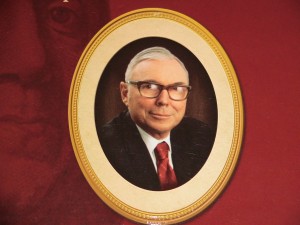
Risk – All investment evaluations should begin by measuring risk, especially reputational
- Incorporate an appropriate margin of safety
- Avoid dealing with people of questionable character
- Insist upon proper compensation for risk assumed
- Always beware of inflation and interest rate exposures
- Avoid big mistakes; shun permanent capital loss
Independence – “Only in fairy tales are emperors told they are naked”
- Objectivity and rationality require independence of thought
- Remember that just because other people agree or disagree with you doesn’t make you right or wrong – the only thing that matters is the correctness of your analysis and judgment
- Mimicking the herd invites regression to the mean (merely average performance)
Preparation – “The only way to win is to work, work, work, work, and hope to have a few insights”
- Develop into a lifelong self-learner through voracious reading; cultivate curiosity and strive to become a little wiser every day
- More important than the will to win is the will to prepare
- Develop fluency in mental models from the major academic disciplines
- If you want to get smart, the question you have to keep asking is “why, why, why?”
Intellectual humility – Acknowledging what you don’t know is the dawning of wisdom
- Stay within a well-defined circle of competence
- Identify and reconcile disconfirming evidence
- Resist the craving for false precision, false certainties, etc.
- Above all, never fool yourself, and remember that you are the easiest person to fool
“Understanding both the power of compound interest and the difficulty of getting it is the heart and soul of understanding a lot of things.”
Analytic rigor – Use of the scientific method and effective checklists minimizes errors and omissions
- Determine value apart from price; progress apart from activity; wealth apart from size
- It is better to remember the obvious than to grasp the esoteric
- Be a business analyst, not a market, macroeconomic, or security analyst
- Consider totality of risk and effect; look always at potential second order and higher level impacts
- Think forwards and backwards – Invert, always invert
Allocation – Proper allocation of capital is an investor’s number one job
- Remember that highest and best use is always measured by the next best use (opportunity cost)
- Good ideas are rare – when the odds are greatly in your favor, bet (allocate) heavily
- Don’t “fall in love” with an investment – be situation-dependent and opportunity-driven
Patience – Resist the natural human bias to act
- “Compound interest is the eighth wonder of the world” (Einstein); never interrupt it unnecessarily
- Avoid unnecessary transactional taxes and frictional costs; never take action for its own sake
- Be alert for the arrival of luck
- Enjoy the process along with the proceeds, because the process is where you live
Decisiveness – When proper circumstances present themselves, act with decisiveness and conviction
- Be fearful when others are greedy, and greedy when others are fearful
- Opportunity doesn’t come often, so seize it when it comes
- Opportunity meeting the prepared mind; that’s the game
Change – Live with change and accept unremovable complexity
- Recognize and adapt to the true nature of the world around you; don’t expect it to adapt to you
- Continually challenge and willingly amend your “best-loved ideas”
- Recognize reality even when you don’t like it – especially when you don’t like it
Focus – Keep things simple and remember what you set out to do
- Remember that reputation and integrity are your most valuable assets – and can be lost in a heartbeat
- Guard against the effects of hubris and boredom
- Don’t overlook the obvious by drowning in minutiae
- Be careful to exclude unneeded information or slop: “A small leak can sink a great ship”
- Face your big troubles; don’t sweep them under the rug
In the end, it comes down to Charlie’s most basic guiding principles, his fundamental philosophy of life: Preparation. Discipline. Patience. Decisiveness.
Source: Poor Charlie’s Almanack via Value Investing World





